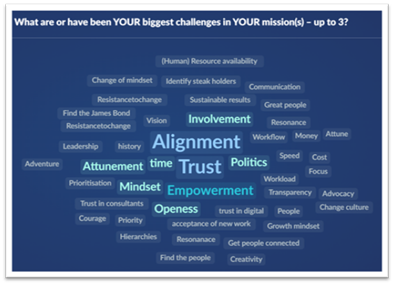Coping with Transformational Times
Create Your Own “Agent Force” to Prepare for Transformation - Now and in the Future.
Within the chemical industry, some of the key questions that require urgent answers are:
- How to best respond to higher ESG goals and requirements and turn sustainability into a competitive advantage?
- How to deal with complex value chains and increase our resilience amidst disruptions?
- How to make the best use of opportunities arising from digital solutions like robotics, AI and machine learning in a chemical process environment?
- How to continue and even accelerate the continuous improvement initiatives to stay competitive?
- How to deal with the demographic developments and the expected loss of experience and knowledge over the coming years?
Most of these questions are currently on the table for chemical companies and will require significant transformational efforts. To succeed, however, these efforts cannot only be of a “technical” nature. They will require a much greater engagement and mobilization of our organizations.
How Do Industry Leaders See the Future?
At the recent ManuChem Conference in Berlin, Germany, we asked more than 100 industry leaders what they saw as the biggest challenges to their transformation missions. These were the answers they gave to our online survey:

As you can see from the word cloud, many of the responses are related to “soft” factors and not to technical methods or solutions. The elements that were mentioned most frequently (i.e., the ones in bigger font) related to the need to create organizational alignment and trust, creating the right mindset of openness and empowerment to make transformations successful.
Many chemical companies still put a lot of their focus on technical improvements or solutions, and less on the development of skills needed to deal with the human, “soft” side of transformations. Those organizations which actively invest in roles like internal change agents, prove to be more successful in sustaining changes.
So, what’s the best way forward?
Creating Your Own Transformation Agent Force
Context, history and possibilities will differ for each organization (and even site), so you will need to develop your own perfect recipe for how to create this transformation force.
However, based on varied project experiences from across many contexts, which proven ingredients are most likely to lead you to success?
- Look for the hidden gems in your organization. You will be surprised by the change talent you have in your organization if you spot them and give them the license, space and authority to act.
- Invest in the development of your change talent – it will not happen accidentally. Equip them with practical methodology that can be used on the job. You will also need to invest to provide them with the right change toolkit and let them experience the real effects of applying it to deal with real challenges.
- Engage your leadership for the change agent idea – talent is the scarcest and most sought-after resource in any organization. Give leaders the confidence to allow their talent to act as change agents because they will get something even more valuable in return.
- Keep things real – avoid a loose group of coaches with no clear scope or topics. Assign them to real activities and improvements, and give them traction and support. When they quickly see the impact they are actually having, it not only boosts the confidence and effectiveness of these change agents, but it is also the best argument for your company.
- Integrate your change agents into the local transformation infrastructure. It is unrealistic and a recipe for failure to place all responsibility for change on the shoulders of change agents. Instead, think of them as catalysts, closely connected to and integrated with local leadership teams and change infrastructure.
No Time to Waste
Transformation requirements and speed will nothing but increase. Preparing for this is vital for chemical companies to pro-actively prepare and have answers for the questions highlighted above. Find your own recipe for setting up an effective agent force for transformation – and feel free to reach out in case of having questions on how to create the optimal mix and make it practically happen.
Authors: Fernando Cruzado, Vice President, Efeso Consulting, and Zuzana Halasova, International Expert Human Dynamics, ROI-Efeso










